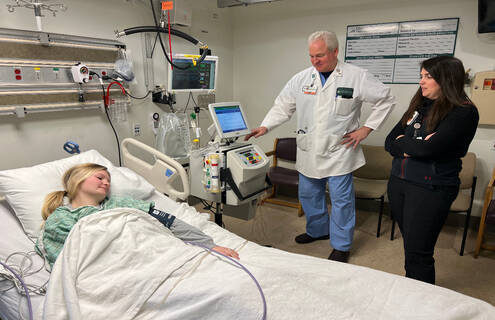
This program promises to save lives and improve patient outcomes like never before.
Robert Westlake, MDCheshire Medical Center, a member of Dartmouth Health, now offers continuous renal replacement therapy (CRRT) in its intensive care unit (ICU), a form of 24-hour dialysis. The new treatment empowers Cheshire clinicians to care for a higher volume of seriously ill patients, improves outcomes and enables patients with kidney injuries to remain close to their home community while they receive treatment. The hospital purchased two CRRT machines, trained the ICU staff on how to use them and with support from the section of Nephrology at Dartmouth Hitchcock Medical Center (DHMC) in Lebanon, began using them earlier this summer.
“All of us at Cheshire are immensely proud to offer this treatment for patients experiencing renal failure,” said Joseph L. Perras, MD, president and CEO of Cheshire Medical Center. “We understand how important it is for family members of patients recovering from cardiac arrest, or any other serious medical issue that resulted in a sudden loss of kidney function, to have their loved ones nearby. Having this technology here enables them to recover close to home, where previously we would have needed to transport someone to another facility.”
An estimated 60% of ICU patients worldwide develop acute kidney injury, a condition defined by the organ’s sudden failure to work properly, according to a study in critical care medicine, and patients experiencing an acute reduction in kidney function face a mortality rate increase of 25% attributable to the issue. Many kidney failures are caused by an interruption in blood flow to the organ due to cardiac arrest or septic shock from an infection in the bloodstream, for example.
“This program promises to save lives and improve patient outcomes like never before,” said Robert Westlake, MD, medical director of the ICU at Cheshire who first proposed investing in CRRT. “During the COVID pandemic, our ICU was very full, and many patients were experiencing serious kidney trouble. Usually, we would send such patients to facilities like Dartmouth Hitchcock Medical Center in Lebanon or other hospitals to receive CRRT treatment, but when hospitals were at capacity, options for these patients were limited.”
Patients in Cheshire’s intensive care unit also benefit from Dartmouth Health’s Center for Connected Care’s TeleICU service. Dartmouth Health’s TeleICU hub, located within Dartmouth Hitchcock Medical Center, is staffed by board-certified intensivists – physicians who have undergone advanced training in providing care for critically ill patients – and critical care nurses. The TeleICU team collaborates with Cheshire’s bedside clinicians to provide real-time care, support, monitoring and clinical consultations 24/7, allowing even the most critically ill patients to receive care close to home. The clinicians communicate using state-of-the-art, two-way, interactive audiovisual technology. Patients who require CRRT at Cheshire are supported by remote nephrologists at DHMC who are able to use the TeleICU platform to assess patients remotely and guide their treatment in concert with local Cheshire critical care physicians and nurses.
Over the past 20 years, the incidence of acute kidney injury requiring continuous renal replacement has increased by 10% per year. Recognizing the increasing scope of the issue, Cheshire has developed this program to manage it. Since its introduction in early August, this dialysis technology has already been used to save lives. And as a secondary function, the device can also preserve organs and blood for potential donation. In the case of one patient who suffered serious neurological injuries and did not survive, a CRRT device made it possible to provide support so that the patient could donate multiple organs, prolonging the lives of five other individuals.
About Cheshire Medical Center
Cheshire Medical Center (Cheshire) is a Dartmouth Health member providing the communities in the Greater Monadnock Region a continuum of care spanning primary care and specialty medicine, to surgical services and acute inpatient care. For more than 130 years, Cheshire has been a key contributor to the health and vitality of the Monadnock Region. As a not-for-profit community medical center, Cheshire is deeply committed to delivering excellent care in a safe and welcoming environment. Cheshire is dedicated to being a great neighbor and serves as an integral community resource. Cheshire is the area's largest healthcare provider and leading employer. Along with the services delivered on their Keene campus and satellite locations, the Medical Center partners with local organizations to provide vital services and programs throughout the region. To learn more, call 603-354-5400 or visit the Cheshire Medical Center website.
About Dartmouth Health
Dartmouth Health, New Hampshire’s only academic health system and the state’s largest private employer, serves patients across northern New England. Dartmouth Health provides access to more than 2,000 providers in almost every area of medicine, delivering care at its flagship hospital, Dartmouth Hitchcock Medical Center (DHMC) in Lebanon, NH, as well as across its wide network of hospitals, clinics and care facilities. DHMC is consistently named the #1 hospital in New Hampshire by U.S. News & World Report, and is recognized for high performance in numerous clinical specialties and procedures. Dartmouth Health includes Dartmouth Cancer Center, one of only 57 National Cancer Institute-designated Comprehensive Cancer Centers in the nation, and the only such center in northern New England; Dartmouth Health Children’s, which includes the state’s only children’s hospital and multiple locations around the region; member hospitals in Lebanon, Keene, Claremont and New London, NH, and Windsor and Bennington, VT; Visiting Nurse and Hospice for Vermont and New Hampshire; and more than 24 clinics that provide ambulatory and specialty services across New Hampshire and Vermont. Through its historical partnership with Dartmouth and the Geisel School of Medicine, Dartmouth Health trains nearly 400 medical residents and fellows annually, and performs cutting-edge research and clinical trials recognized across the globe with Geisel and the White River Junction VA Medical Center in White River Junction, VT. Dartmouth Health and its more than 13,000 employees are deeply committed to serving the healthcare needs of everyone in our communities, and to providing each of our patients with exceptional, personal care.